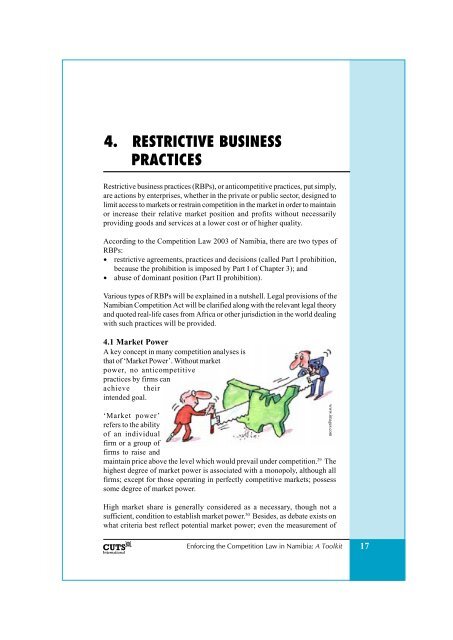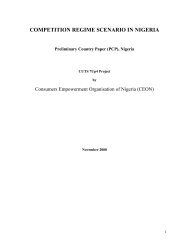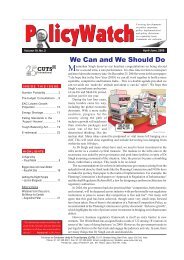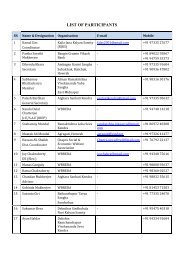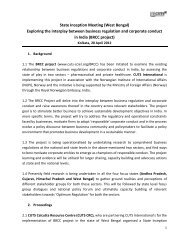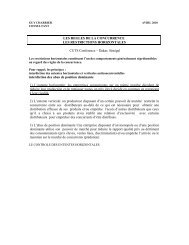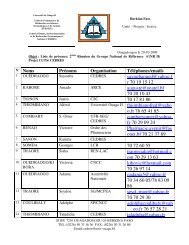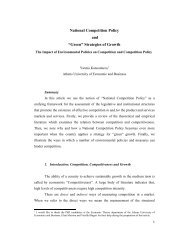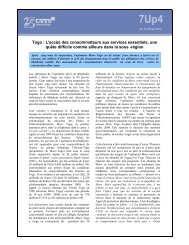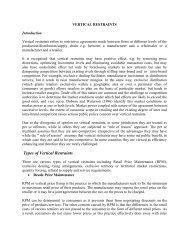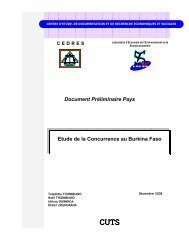Enforcing the Competition Law in Namibia A Toolkit - cuts ccier
Enforcing the Competition Law in Namibia A Toolkit - cuts ccier
Enforcing the Competition Law in Namibia A Toolkit - cuts ccier
You also want an ePaper? Increase the reach of your titles
YUMPU automatically turns print PDFs into web optimized ePapers that Google loves.
4. RESTRICTIVE BUSINESSPRACTICESRestrictive bus<strong>in</strong>ess practices (RBPs), or anticompetitive practices, put simply,are actions by enterprises, whe<strong>the</strong>r <strong>in</strong> <strong>the</strong> private or public sector, designed tolimit access to markets or restra<strong>in</strong> competition <strong>in</strong> <strong>the</strong> market <strong>in</strong> order to ma<strong>in</strong>ta<strong>in</strong>or <strong>in</strong>crease <strong>the</strong>ir relative market position and profits without necessarilyprovid<strong>in</strong>g goods and services at a lower cost or of higher quality.Accord<strong>in</strong>g to <strong>the</strong> <strong>Competition</strong> <strong>Law</strong> 2003 of <strong>Namibia</strong>, <strong>the</strong>re are two types ofRBPs:• restrictive agreements, practices and decisions (called Part I prohibition,because <strong>the</strong> prohibition is imposed by Part I of Chapter 3); and• abuse of dom<strong>in</strong>ant position (Part II prohibition).Various types of RBPs will be expla<strong>in</strong>ed <strong>in</strong> a nutshell. Legal provisions of <strong>the</strong><strong>Namibia</strong>n <strong>Competition</strong> Act will be clarified along with <strong>the</strong> relevant legal <strong>the</strong>oryand quoted real-life cases from Africa or o<strong>the</strong>r jurisdiction <strong>in</strong> <strong>the</strong> world deal<strong>in</strong>gwith such practices will be provided.4.1 Market PowerA key concept <strong>in</strong> many competition analyses isthat of ‘Market Power’. Without marketpower, no anticompetitivepractices by firms canachieve <strong>the</strong>ir<strong>in</strong>tended goal.‘Market power’refers to <strong>the</strong> abilityof an <strong>in</strong>dividualfirm or a group offirms to raise andma<strong>in</strong>ta<strong>in</strong> price above <strong>the</strong> level which would prevail under competition. 29 Thehighest degree of market power is associated with a monopoly, although allfirms; except for those operat<strong>in</strong>g <strong>in</strong> perfectly competitive markets; possesssome degree of market power.High market share is generally considered as a necessary, though not asufficient, condition to establish market power. 30 Besides, as debate exists onwhat criteria best reflect potential market power; even <strong>the</strong> measurement of<strong>Enforc<strong>in</strong>g</strong> <strong>the</strong> <strong>Competition</strong> <strong>Law</strong> <strong>in</strong> <strong>Namibia</strong>: A <strong>Toolkit</strong> 17www.images.com


